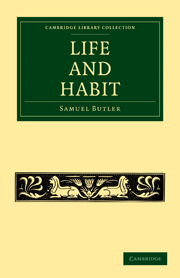Book contents
- Frontmatter
- PREFACE
- Contents
- CHAP. I ON CERTAIN ACQUIRED HABITS
- CHAP. II CONSCIOUS AND UNCONSCIOUS KNOWERS—THE LAW AND GRACE
- CHAP. III APPLICATION OF FOREGOING CHAPTERS TO CERTAIN HABITS ACQUIRED AFTER BIRTH WHICH ARE COMMONLY CONSIDERED INSTINCTIVE
- CHAP. IV APPLICATION OF THE FOREGOING PRINCIPLES TO ACTIONS AND HABITS ACQUIRED BEFORE BIRTH
- CHAP. V PERSONAL IDENTITY
- CHAP. VI PERSONAL IDENTITY—(continued)
- CHAP. VII OUR SUBORDINATE PERSONALITIES
- CHAP. VIII APPLICATION OF THE FOREGOING CHAPTERS — THE ASSIMILATION OF OUTSIDE MATTER
- CHAP. IX ON THE ABEYANCE OF MEMORY
- CHAP. X WHAT WE SHOULD EXPECT TO FIND IF DIFFERENTIATIONS OF STRUCTURE AND INSTINCT ARE MAINLY DUE TO MEMORY
- CHAP. XI INSTINCT AS INHERITED MEMORY
- CHAP. XII INSTINCTS OF NEUTER INSECTS
- CHAP. XIII LAMARCK AND MR. DARWIN
- CHAP. XIV MR. MIVART AND MR. DARWIN
- CHAP. XV CONCLUDING REMARKS
CHAP. VII - OUR SUBORDINATE PERSONALITIES
Published online by Cambridge University Press: 29 August 2010
- Frontmatter
- PREFACE
- Contents
- CHAP. I ON CERTAIN ACQUIRED HABITS
- CHAP. II CONSCIOUS AND UNCONSCIOUS KNOWERS—THE LAW AND GRACE
- CHAP. III APPLICATION OF FOREGOING CHAPTERS TO CERTAIN HABITS ACQUIRED AFTER BIRTH WHICH ARE COMMONLY CONSIDERED INSTINCTIVE
- CHAP. IV APPLICATION OF THE FOREGOING PRINCIPLES TO ACTIONS AND HABITS ACQUIRED BEFORE BIRTH
- CHAP. V PERSONAL IDENTITY
- CHAP. VI PERSONAL IDENTITY—(continued)
- CHAP. VII OUR SUBORDINATE PERSONALITIES
- CHAP. VIII APPLICATION OF THE FOREGOING CHAPTERS — THE ASSIMILATION OF OUTSIDE MATTER
- CHAP. IX ON THE ABEYANCE OF MEMORY
- CHAP. X WHAT WE SHOULD EXPECT TO FIND IF DIFFERENTIATIONS OF STRUCTURE AND INSTINCT ARE MAINLY DUE TO MEMORY
- CHAP. XI INSTINCT AS INHERITED MEMORY
- CHAP. XII INSTINCTS OF NEUTER INSECTS
- CHAP. XIII LAMARCK AND MR. DARWIN
- CHAP. XIV MR. MIVART AND MR. DARWIN
- CHAP. XV CONCLUDING REMARKS
Summary
We have seen that we can apprehend neither the beginning nor the end of our personality, which comes up out of infinity as an island out of the sea, so gently, that none can say when it is first visible on our mental horizon, and fades away in the case of those who leave offspring, so imperceptibly that none can say when it is out of sight. But, like the island, whether we can see it or no, it is always there. Not only are we infinite as regards time, but we are so also as regards extension, being so linked on to the external world that we cannot say where we either begin or end. If those who so frequently declare that man is a finite creature would point out his boundaries, it might lead to a better understanding.
Nevertheless, we are in the habit of considering that our personality, or soul, no matter where it begins or ends, and no matter what it comprises, is nevertheless a single thing, uncompounded of other souls. Yet there is nothing more certain than that this is not at all the case, but that every individual person is a compound creature, being made up of an infinite number of distinct centres of sensation and will, each one of which is personal, and has a soul and individual existence, a reproductive system, intelligence, and memory of its own, with probably its hopes and fears, its times of scarcity and repletion, and a strong conviction that it is itself the centre of the universe.
- Type
- Chapter
- Information
- Life and Habit , pp. 104 - 124Publisher: Cambridge University PressPrint publication year: 2009First published in: 1878



